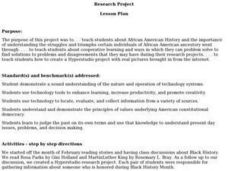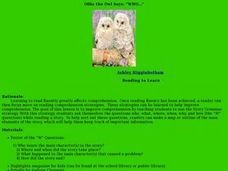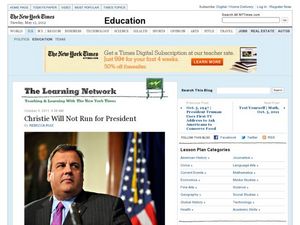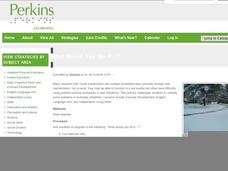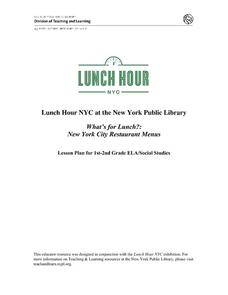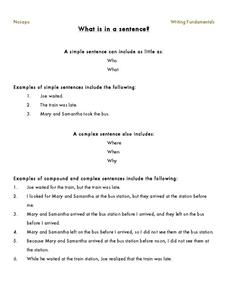Curated OER
The Whole Story
Students collect and convey information about a current event. By focusing on who, what, when, where, why, and how questions, students study to thoroughly analyze and report on important world events.
Curated OER
Question Word Wizard
This literacy PowerPoint instructs students on how to answer the five W's (who, what, when, where, why and how). Each slide contains hints on how to answer the question word appropriately and with detail.
Curated OER
Who, What, When, Where, Why, and the Media
Students in a preschool classroom discuss potentially fearful current events in a way they can understand. They write or draw about a current event, discussing the 5 W's of news reporting.
Overcoming Obstacles
Setting Priorities
One step at a time! High schoolers learn how to set priorities by creating a list of tasks they must complete that week, adding the consequences of not completing each task, and identifying the conflicts that will arise. They then...
Curated OER
Las Palabras Interrogativas
Learn how to use the Spanish interrogative words: quien, que, and cuando in this PowerPoint. The correct use of these words are outlined and organized in great detail, followed by ten enrichment question for students to answer. Tip: Ask...
Curated OER
Research Project
Students fill out a form which asked the WHO, WHAT, WHEN, WHERE, and WHY about the person they were assigned to research, they gather their information from different web sites on Lightspan and Yahooligans. They create a HyperStudio and...
Curated OER
Ollie the Own Says: WHO
Scholars examine the strategy of making a story map or outline to identify the main elements of a story. They discuss the who, what, where, when, why, and how of a story, in an outline form. As a class they read a short story, answer the...
Curated OER
The Atlanta Testing Scandal
What happens when a school is caught tampering with state test scores? Learners find out about the Atlanta Testing Scandal as they read a New York Times article. After they read, they test their comprehension by answering seven who,...
Curated OER
Christie Will Not Run for President
Readers answer eight who, what, when, why, and where questions as they read this New York Times article. They peruse the article to learn about Chris Christie and the 2012 presidential race. Next, they answer the related comprehension...
Curated OER
Genome: The Secret of How Life Works
What do you have in common with a fruit fly? About 60 percent of your DNA. The resource, divided into two units, is intended for grades four to eight and another for high schoolers. Both units include eight lessons covering the genome as...
Read Works
American Government Preamble to the United States Constitution
Observe Constitution Day with a activity that delves deep into the who, what, why, when, where, and how of the U.S. Constitution. Scholars read a short informational text then answer 10 questions—short answer and multiple choice.
Floyd County Schools
Who Is Hibernating?
Young scientists explore the wintertime behavior of common animals with this presentation on hibernation. Offering clear explanations about the who, what, where, when, and why regarding hibernation, this resource is perfect for primary...
Teaching Tolerance
Reflection: What’s Your FRAME?
Encourage your class to recognize the diversity in the beliefs and backgrounds of their peers. Learners use the acronym FRAME to consider culture, background, and life experiences.
Curated OER
Who? What? Where? When? - Story Elements
Second graders see how to identify and describe character, setting, and plot in various stories from picture books and story videos. They use picture books and story videos to practice identifying and describing the story elements.
Nosapo
Family Titles, Pronouns, Writing about a Person
How is your grandmother related to you? How is your cousin related to your grandmother? Learn about family relationships and pronouns with an activity that guides pupils to write two short narratives about members of their families.
Perkins School for the Blind
What Would You Do If...?
What would you do if...? That's a great question, and, when posed to learners with visual impairments, a question that can foster concept development and speaking and problem-solving skills that relate to real-life situations. The...
Overcoming Obstacles
Gathering Information
Before making important decisions, gathering as much information as possible is best. That's the take-away from the second lesson in the Decision-Making module of the Overcoming Obstacles course. Middle schoolers engage in a series of...
iCivics
Step Five: All about Public Policy
Public policy is important to understand because it affects everyone. The resource tells middle schoolers how the government uses policy to accomplish goals in the administration. It includes a reading, true or false worksheet, a...
Curated OER
The Great Depression and Everyday Life
Examine everyday life during the Great Depression, as well as the effects if the Depression on American population, society, and economy. Learners write who, what, where, when, and why summaries of a person who relocated to California...
Society for Science & the Public
Easter Islanders Made Tools, Not War
When studying artifacts, especially tools, how do archaeologists determine what the devices were used for? In what ways might researchers' previous experiences influence their perception of an artifact? An article about researchers'...
New York Public Library
What's for Lunch?: New York City Restaurant Menus
Do you remember the days when a cup of coffee cost five cents? At A.W. Dennett restaurant in 1894, you could buy a five-cent cup of coffee and as well as a five-cent slice of pie to accompany it. The menu from that year is a primary...
Nosapo
What Is in a Sentence, Paragraph, and Story?
Language arts is made up of many parts. Learners review the parts of a sentence, as well as how to make a simple sentence into a complex sentence, before examining full paragraphs and identifying the topic, body, and concluding sentence...
Curated OER
Commercials...What Are They Saying?
Students identify how culture and experiences influence people's perceptions of places and regions. They list and apply the generalizations pulled from these observations.
Curated OER
Questions or Statements?
Students are introduced to the six question words of who, what, when, where, why and how. After being read a story, they are asked who and what the story was about. To end the lesson plan, they practice identifying questions and...







